- Home
- Ian McDonald
Desolation Road Page 11
Desolation Road Read online
Page 11
“And Arnie Tenebrae, me!” said little Arnie Tenebrae, bouncing up and down in excitement.
“We're called The Hand,” said the stranger. He had a strange voice, as if he were speaking from deep down in a dream. “Where is this place?”
“This is Desolation Road!” chorused the children. “Come on.” And the two grabbed hands and one ran outrider and one ran van and they galloped up the bluffs and through the green tree-hung alleys of Desolation Road to the Bethlehem Ares Railroad/Hotel, for that was the place all strangers came to first.
“Look what we've found,” said the children.
“He's called The Hand,” piped Arnie Tenebrae.
“He's come all the way across the Great Desert,” said Limaal. A rumble passed among the clients, for only Dr. Alimantando (lost in time chasing a legendary green man, God be kind to him in his folly) had ever ever ever come across the Great Desert.
“He'll be wanting a drink then,” said Rael Mandella, and nodded for Persis Tatterdemalion to draw off a glass of cold maize beer.
“Thank you kindly,” said The Hand in his funny faraway voice. The offer of acceptance was made and received. “Might we take off our boots? The Great Desert's hard on feet.” He unslung his guitar, sat down on a table, and the glow from his picture-suit cast odd shadows over his shark features. The children sat around him, waiting to be praised for their wonderful find. The man called The Hand pulled off his boots and everyone gave a cry of consternation.
His feet were slim and fine as ladies’ hands, his toes long and flexible as fingers and his knees, his knees bent backward as well as forward, like a bird's.
Then Persis Tatterdemalion spoke and calmed the storm “Hey, mister, play us a tune on your guitar, will you?”
The Hand's eyes sought out his questioner, far away in the back-bar shadows. He stood and executed a complex bow, impossible for any less flexible than he. Time-lapse images of flowers blooming passed over his picture-suit.
“Because the lady asks, we think we will.” He picked up his guitar and struck a harmonic. Then he touched his long slender fingers to the strings and released a swarm of notes into the air.
There was never such music played as played that afternoon in the Bethlehem Ares Railroad/Hotel. The music found notes in the tables and the chairs and the mirrors and the walls; it found melodies in the bedroom and the kitchen, the cellar and the shithouse, and dragged tunes out of the places where they had lain hidden undiscovered for years, found them, took them, and made them part of the greater self. There were tunes that made feet tap and tunes that brought out bouts of dancing. There were tunes that kicked over the tables and tunes that made the glassware rattle. There were tunes to make you smile and tunes to make you cry and tunes that sent delicious shivers down your back. There was the grand ancient music of the desert and the airy, breathy music of the sky. There was the music of dancing firelight and the infinite whistle of distant stars, there was merriment and magic and mourning and madness; music leaping, music crying, music laughing, music loving, music living, music dying.
When it was finished no one could believe it was over. No one could believe that just one man, with a guitar lying in his lap, could have made such mighty music. A ringing stillness filled the air. The Hand flexed his curious fingers, his curious toes. Desert sunsets glowed red and purple on his picture suit. Then Umberto Gallacelli called out, “Hey, mister, just where do you come from?”
No one had heard Mr. Jericho enter. No one had seen him take a seat at the bar. No one even knew he was there until he said, “I'll tell you where he's from.” Mr. Jericho pointed at the ceiling. “Am I right?”
The Hand stood up, tense and sharp-edged.
“Outside, right?” Mr. Jericho pressed home his reasoning. “The feet, that's the way they're born for use in open gravity, isn't it? Extra hands? And the picture-suit, that's a universal tool among ROTECH orbital personnel for reviewing visual information at a glance: I reckon it's just running a random test pattern in the absence of data, am I right?”
The Hand did not say yes or no. Mr. Jericho continued.
“So, what are you doing here? Exclusion orders prohibit space adapted humans from coming to the surface except under permiso. You got a permiso?” The man called The Hand tensed, ready to flee, his red guitar held defensively before him. “Maybe you should have a talk with our district supervisor, the mayor Dominic Frontera. He can have the ROTECH boys in China Mountain check you out.”
Not even the prodigious experience of Mr. Jericho's Exalted Ancestors could have prepared him for what The Hand did next. A screaming power-chord from the red guitar twisted the world away and tore at the mind with chromium teeth. Under cover of the guitar-scream, The Hand was gone, the children with him.
Limaal, Taasmin, Johnny Stalin, and Arnie Tenebrae hid The Hand in a small cave behind Mr. Blue Mountain's house. It was the very best of hiding places. No one would find The Hand here because no one grown up even knew there was a secret cave here. There were a lot of places around Desolation Road which no one grown up knew were there, dozens of really good places where a toy or an animal or a man could be hidden away for a long long time. Once Limaal and Taasmin had tried to hide Johnny Stalin away in a secret cave, but he had thrown a screaming tantrum and his mother had come flapping to the rescue. That was one hiding place they could not use again.
They had brought The Hand stolen things they thought he would need to make him comfortable: a rug, a cushion, a plate and a glass, a jug of water, some candles, some oranges and bananas. Arnie Tenebrae gave him her colouring book and new wax crayons which she had been given for her birthday and which had come all the way from the catalogue sales shop in the big city. Miniature Magi, they presented their gifts to The Hand. He accepted their tribute graciously and rewarded them with a tune and a story.
This is the story The Hand told.
In the flying cities that circled the earth like shards of shattered glass there lived a race of men who still laid claim to the bond of common humanity with their world-bound brothers but who, in their centuries of self-imposed high exile, had grown so strange and alien that they were in truth a separate species. This magical race had been charged with two great tasks. These tasks were the reason for their people's existence. The first was the care and maintenance, and, until such time as it might govern itself, the administration of the world their ancestors had built. The second was its defence against these alien powers which might wish, out of jealousy, greed or outraged pride, to destroy man's greatest work. The fulfilling of these sacred mandates, imposed by the Blessed Lady herself, demanded such concentration of effort by the sky-folk that none could be spared for lesser tasks. Therefore one simple law was made.
It was that at the age of majority and reason, when a person assumes the mantle of responsibility, each individual must choose between their futures. The first was to follow the ways of the ever-living ancestors, take the Catherinist vows and serve ROTECH and its celestial patroness. The second was to submit to the adaptive surgery of the physicians and choose exile and a new life, wiped clean of the memories of all that was before, upon the world below. The third was either to break free from the flesh and merge with the machines to live a disembodied ghost in the computer-net, or set the controls of the transmat machine to a well-guarded set of coordinates known as Epsilon Point, where the quasi-sentient Psymbii, vegetative creatures of light and vacuum, would come and take that individual and wrap themselves around, into, through him until they became a symbiote of flesh and vegetable, living free in the vast spaces of the moonring.
Yet there were those who found all of these futures horrible to contemplate and chose their own. Some wished to remain the folk they were and went unadapted to the world below, where they lived only a short while and died in great misery. Some took ships and sailed away into the night toward the nearer stars and were never heard of again. And some sought refuge behind the walls of the world in the air-shafts and light-wells, brothers and si
sters of the rats.
Such a one was The Hand. Upon his tenth birthday, the traditional day of decision, he stole his brother's picture-cloth suit and slipped behind the walls to run the tunnels and catwalks, for it was not the Blessed Lady he wished to serve, but Music. And he became Lord of the Dark Places, a thing quickly said in few words, not so quickly done: King in a world where music was law and the electric guitar master of light and darkness.
As evening shadows grew to infinite lengths down the lightwells of Carioca Station, bright-winged creatures like heroin angels would flash across the echoing spaces and cluster like vampires, their wings shrouded about them, upon spars and rigging wires to witness the duels of music. All dark-time long until, like vampires, the strengthening sunlight drove them into the shadows, they would listen to the guitars clash. The shafts and tunnels would ring to the crazy music, the guitars would wail and scream like sweating lovers, and responsible citizens who lived by law and duty would wake from their free-fall dreams to catch tailing echoes of wild, free music wafting from their air-conditioning slots, music like they had never dreamed before. And when all the fights were fought and the last droplets of blood squeezed from shattered fingertips, when the last seared guitar corpse had been sent spinning out of the locks into space, the King was crowned and everyone proclaimed that The Hand and his red guitar were the greatest on Carioca Station.
For a season The Hand ruled the tunnels and runways of Carioca Station and there was none to challenge him. Then word came that the King of McCartney Station wished to call out the King of Carioca Station. The gauntlet was down. The purse was the Kingdom of the loser, and all his subjects.
They met in an open-gravity observation blister beneath slow wheeling stars. All that day the King of Carioca Station's picture suit (which he wore in preference to the rags, plastics, metals and synthetic furs of the behind-wallers) had projected black and white pictures of incredible antiquity: a visual entertainment whose name, translated from the ancient languages, meant “White House.” Then the King of Carioca Station's steward handed him his freshly tuned guitar. He touched his fingers to the strings and felt the evil genius thrill up his arm and liquefy his brain. The King of McCartney Station's stewards passed him his machine: a nine-hundred-year-old Stratocaster. Sunlight flared from its sunburst finish and awed the spectators, clinging by feet and tails to the traverse wires, into holy silence.
The adjudicator gave a signal. The duel began.
All through the compulsory fugues the King of McCartney Station matched the King of Carioca Station. Their melodies curled and twined around each other's themes like birds in flight with such precise skill that no one could tell where one ended and another began. Their free-form improvisations sang into the cathedral vastness of Number Twelve airshaft and flakes of crystallized power-chords sifted down like snow to powder the heads of the girls with stardust. The guitars stalked each other through the harmonic landscapes of the modes: the Ionian, the Dorian, the Phrygian, Lydian and Mixolydian, the Aeolian and the Locrian. Time slowed in a jungle of scales and arpeggios: there was no time, the stars froze in their arcing paths, tracing slow silver snail tracks across the glassite cap-dome. The guitars flashed like switchblades, like methadone dreams. The guitars cried like violated angels. Back and forth the battle swayed, but still neither could gain advantage over the other.
The King of Carioca Station knew he had met his match in the King of McCartney Station. Now there was only one way left for him to win, and the price of that victory would be terrible indeed. But the guitar, having smelled blood and steel on the wind, would not now permit its slave the weak luxury of surrender.
The King of Carioca Station, who was The Hand, reached inside him to the dark place where the wild things were and with a prayer to the Blessed Lady he opened that dark place to the light and let the blackness pour out of him. Released, the red guitar roared like a demon in heat and sucked the dark fluid up into its internal amplifiers and synthesizers. Its strings ran with purple lightning and rang with alien harmonics like no one had ever dreamed could be. The dark music struck out like the fist of God. The audience fled screaming from the black, living unclean thing The Hand had unleashed. A tongue of dark lightning stabbed out from the red guitar and burst the stranger's Stratocaster into smoking chunks. For an instant the inside of the stranger's skull lit up with heavenlight and then his eye sockets burned out in a flash and smoke trickled from them and he was dead dead dead and the King of Carioca Station was King indeed, King of two worlds, but what was the price, of what was the price, the price he paid for his crown?
Then grim-faced winged women in tight yellow stretch suits swarmed out of every hatchway: Station Security, armed with shock-staves and love-guns. They rounded the King's subjects into neat groups of six and took them away to an uncertain but assured future. They sprayed the charred, cartwheeling corpse of the King of McCartney Station with fire-retardant foam. They took away the King of Two Worlds in a bundle of narcotic floss, and his red guitar with him. They took the King to the healers of St. Catherine's, who would execute the judgment of the Group of Nineteen by the administration of tiny, oh-so-carefully measured doses of myelin suppressants, through which they would restore the soul of the murdered man to life once more, within his murderer's body, and that murderer would pay with his laughing screaming soul and be no more.
This would have been the end of The Hand had he not escaped from the holy doctors of St. Catherine's. How he escaped from them, he will not say, suffice that he escaped and saved his red guitar from the furnaces and together they set the controls of the station transmat cubicle for the forbidden earth beneath. With the speed of thought he, his guitar, and the embryonic soul of the King of McCartney Station were transported into the industrial ghetto of Touchdown, where they were shown mercy mild by the Little Sisters of Tharsis and taken into their charity home for crippled mendicants. An old legless beggar had taught him to walk free from his wheelchair, another thing soon said but slowly realized, and guessing The Hand's origin, taught him all the old man knew of this world's ways, for he must learn such things or perish, and organized his escape from the Little Sisters of Tharsis. The Hand begged a ride on a truck convoy across the Ecclestiastes Mountains into the ancient heartland of the Great Oxus, where he wandered for a year and a day among the rice farms offering to plant seedlings in the flooded paddies with his dextrous feet. At night he would entertain the farm folk with tunes from his red guitar and earn a bowl of soup or a glass of beer or a few centavos in his pocket.
But he knew no peace, for the soul of the man he had murdered would give him no peace. At night it would wake him from his sleep in a scream and a sweat from the dreams of his own dying. Pricking him with guilt every time he touched the strings of the red guitar, the ghost drove him onward through constant reminders of what the holy doctors of St. Catherine's had yet to do to him. So The Hand wandered the length and breadth of the wide world, for the holy doctors of St. Catherine's were searching for him across the face of the globe and if he ever stopped moving they would find him, take him back to the sky, and destroy him. This was the curse of The Hand, forever to wander the world with his red guitar on his back, pursued by the ghost of a murdered man waiting behind his eyes to take his soul.
“That was a good story,” said Arnie Tenebrae.
“Every man's story is a good story,” said Rael Mandella. The children shrieked in alarm. The Hand reached for his red guitar to fire another paralyzing chord. “Easy,” said Rael Mandella. “I wish you no ill.” To the children he said, “You should be more careful with the water next time you want to hide someone. I followed the trail of drips right to this place. Why did you do it?”
“Because he was our friend,” said Limaal Mandella.
“Because he needed someone to be kind to him,” said Taasmin Mandella.
“Because he was scared,” said Arnie Tenebrae.
“You're not going to tell anyone he's here, are you?” said Johnny Stalin. T
he children chorused their protest.
“Quiet,” said Rael Mandella, suddenly filling the cave with his presence. “I've heard your story, Mr. Hand, and I tell you this, what a man's done in his past is no matter to me, nor should it be to anyone else. When Dr. Alimantando (you remember him, kids?) invented this place, he said that no one would ever be turned away because of what they had done before. This was to be a place of fresh starts. Well, Dr. Alimantando's gone now, into the past or the future I don't know, but I think he was right. This is a place for fresh starts. Now, I don't hold with all this newfangled mayor stuff; things went much better when Dr. Alimantando looked after the place. And I don't hold with people running up to this mayor and asking him for all the right answers; I say the right answers are inside you all along or they aren't there at all, which is just another way of saying that I'm not telling anyone you're here. I'll tell them if they ask, and so will you, kids, that you saw him walking off across the tracks, because if what you say is true, you'll have to be moving on soon enough anyway.”
The Hand nodded, a small bow of gratitude.
“Thank you, sir. We'll be moving on tomorrow. Is there anything we can do for you to demonstrate our gratitude?”
“Yes,” said Rael Mandella. “You say you're from the Outside, maybe then you'll know why it hasn't rained for one hundred and fifty thousand years. Come on, kids, practice your alibis and come for dinner at my house.”
The ground was sparkling with frost under a steel-grey sky when Rael Mandella took the pot of porridge and two bananas to the refugee in his cave. Rael Mandella enjoyed the peace of the hours before the rest of the world woke with a yawn and a fart. Usually only the birds ever woke before he; therefore he was much surprised to find The Hand awake and alert and intent upon some inscrutable private business. His picture-suit had gone black as night, and upon it lines, like the spokes of a wheel, crowded with flashing digits and scurrying graphs and coloured sentences, spun across the remarkable fabric. The small cave was filled with shimmering light.

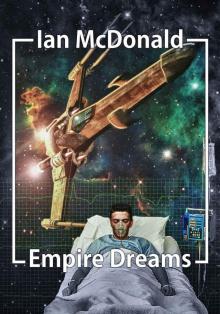 Empire Dreams
Empire Dreams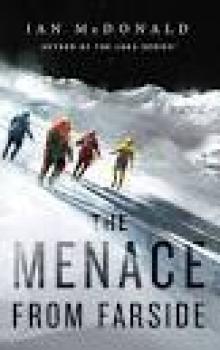 The Menace from Farside
The Menace from Farside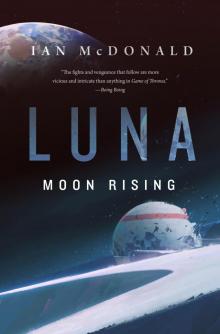 Luna: Moon Rising
Luna: Moon Rising Moon Rising
Moon Rising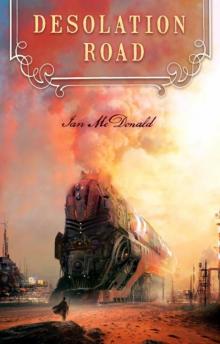 Desolation Road dru-1
Desolation Road dru-1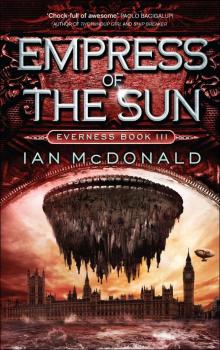 Empress of the Sun
Empress of the Sun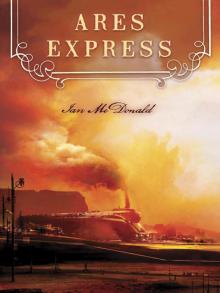 Ares Express dru-2
Ares Express dru-2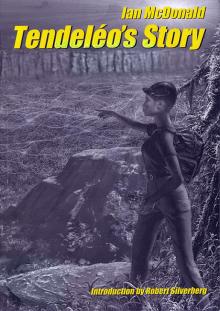 Tendeléo’s Story
Tendeléo’s Story River Of Gods
River Of Gods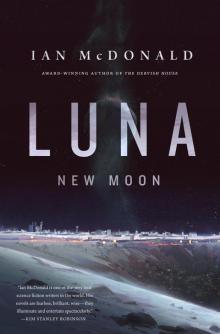 Luna
Luna![Cyberabad Days - [River of Gods 02] Read online](http://i1.bookreadfree.com/i1/03/29/cyberabad_days_-_river_of_gods_02_preview.jpg) Cyberabad Days - [River of Gods 02]
Cyberabad Days - [River of Gods 02]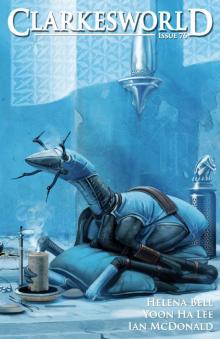 Clarkesworld Magazine Issue 76
Clarkesworld Magazine Issue 76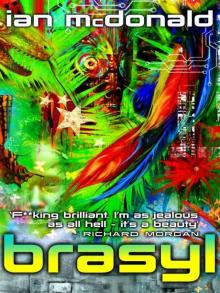 Brasyl (GollanczF.)
Brasyl (GollanczF.)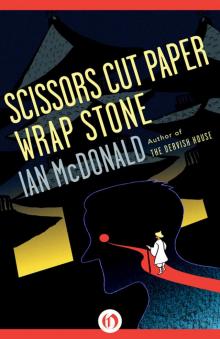 Scissors Cut Paper Wrap Stone
Scissors Cut Paper Wrap Stone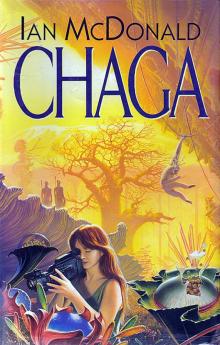 Chaga
Chaga Time Was
Time Was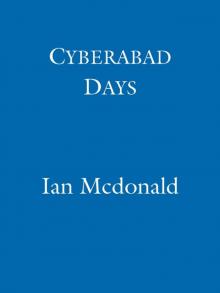 Cyberabad Days
Cyberabad Days Be My Enemy
Be My Enemy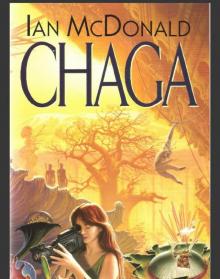 Changa
Changa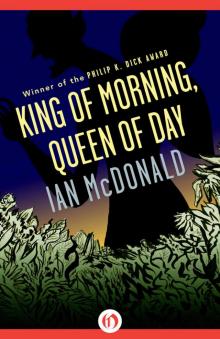 King of Morning, Queen of Day
King of Morning, Queen of Day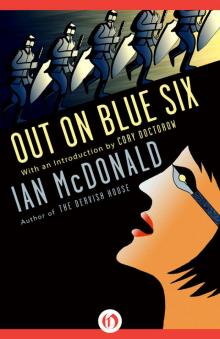 Out on Blue Six
Out on Blue Six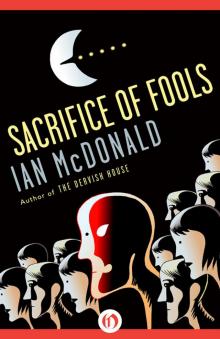 Sacrifice of Fools
Sacrifice of Fools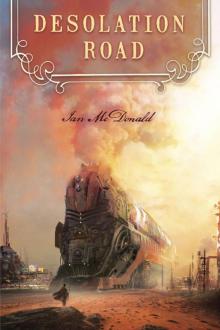 Desolation Road
Desolation Road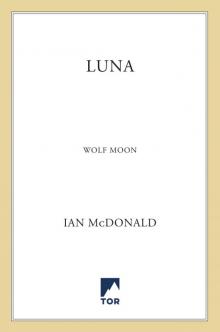 Luna--Wolf Moon--A Novel
Luna--Wolf Moon--A Novel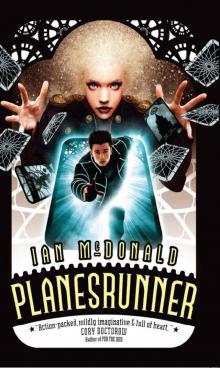 Planesrunner (Everness Book One)
Planesrunner (Everness Book One)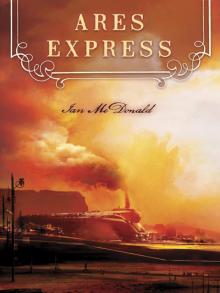 Ares Express
Ares Express